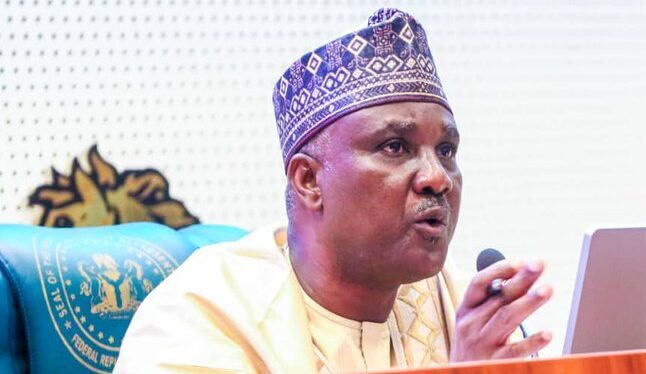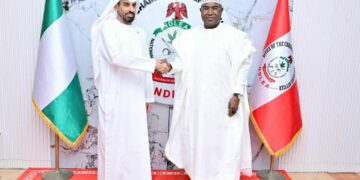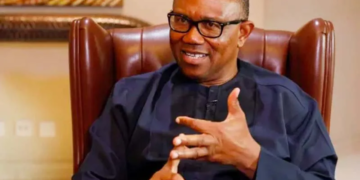The Speaker of the House of Representatives, Hon. Tajudeen Abbas, has said Nigeria must adopt renewable energy to diversify its economy.
According to Abbas, the case for renewable energy is compelling as it holds substantial implications for national policy agendas.
The speaker noted that Nigeria is assuming a continental leadership role in the race to electrify Africa, with a bold target to help provide electricity to 300 million Africans by 2030.
Abbas stated these while declaring the opening of the ‚First Legislative Conference and Expo on Renewable Energy in Nigeria‘ organised by the House Committee on Renewable Energy and the United Nations Development Programme (UNDP) in Lagos on Monday.
The speaker applauded President Bola Tinubu’s approval of a $1 billion financing initiative for the Rural Electrification Agency in December 2024.
He said: „The transition to renewable energy is not just an economic necessity; it holds substantial implications for national policy agendas. Renewable energy has become central to initiatives to foster inclusive economic growth, climate adaptation, and industrial innovation.
“Countries that have embraced this change have decreased their vulnerability to global fuel price fluctuations, improved energy access, and positioned themselves as leaders in the low-carbon economy.“
The Speaker added that renewable energy „is no longer a niche concern but a cornerstone of global development policy. In 2024, renewable energy additions reached five hundred eighty-five gigawatts, accounting for over ninety-two per cent of new power generation capacity worldwide.
“The total installed capacity for renewable energy now exceeds four thousand four hundred forty-eight gigawatts, marking a fifteen per cent year-on-year increase. This expansion, led by solar and wind technologies, underscores their cost-effectiveness and scalability.
“Financial flows toward clean energy reinforce this trend. In 2023, of the estimated global energy investment of 2.8 trillion dollars, 1.7 trillion was committed to renewable energy, energy efficiency, and electric mobility. This shift in capital allocation signifies a structural reorientation of the global energy economy, where more sustainable alternatives are increasingly displacing fossil fuels.
“For Nigeria, a country that relies heavily on fossil fuel exports for its earnings, this transition presents both challenges and opportunities. As the global market shifts toward cleaner energy, countries like Nigeria will have no choice but to diversify their economy to maintain their financial stability while seeking investments in renewable energy sources to align with global trends.“
Speaker Abbas reiterated Nigeria‘s commitment to global energy reform, as demonstrated in the Legislative Agenda of the 10th House, which prioritises energy reform.
“Specifically, Strategic Objective 8.5 of our Agenda aims to promote the transition to renewable energy while enhancing clean energy production and access. To achieve this, we are enacting laws encouraging private investment in renewable energy, including tax incentives and targeted financing.
„Just a few weeks ago, the House of Representatives passed new tax reform bills that eliminate VAT on renewable energy and compressed natural gas (CNG), among other measures. We are also working to provide legal backing for the government’s Renewable Energy and Energy Efficiency Policy adopted in 2015, which seeks to boost the use of renewable energy, improve energy efficiency, and significantly reduce greenhouse gas emissions.
“We acknowledge the urgent need to provide more access to clean cooking fuels, as this is crucial for public health and the environment. These initiatives are being developed in close collaboration with stakeholders, and the House Committee on Renewable Energy is coordinating legislative priorities in this area.“
“The administration has also committed significant funding. In December 2024 alone, the President approved a one-billion-dollar financing initiative for the Rural Electrification Agency. Of this amount, seven hundred and fifty million dollars has been allocated to expand solar energy access in underserved areas.
“As a result, this initiative has led to the deployment of one hundred and twenty-four mini-grids and over twenty-five thousand solar home systems, benefiting more than two hundred thousand people,“ he added.
In a welcome remark, the committee chairman, Hon. Victor Ogene, said renewable energy, as an emerging sector in Nigeria, has garnered significant attention from the government as a key solution to our electricity power supply issues, and deliberate steps are being taken to harness its potential.“
Ogene added that there is a growing consensus that achieving greater energy security and sustainability requires deliberate action to chart a new pathway to reducing Nigeria‘s reliance on fossil fuels as a primary energy source.
“While we still grapple with finding the right balance between both, it is also important to point out that, paradoxically, we are yet to achieve meaningful energy sufficiency, even with our current focus on fossil fuel-based energy.
“The persistent power supply challenges we face are not just a technical issue; they are a barrier to our national development. To move forward, we must embrace renewable energy as a critical component of our energy strategy,” he said.
In a presentation, the UNDP Resident Representative, Elsie Attafuah, highlighted the importance of energy to Nigeria‘s future, noting that it has „evolved into a national security, economic power, and geopolitical leverage tool and instrument.
“Energy is the foundation for Nigeria‘s economic diversification. Without it, neither industrial transformation nor acceleration is possible,“ adding that Nigeria possesses massive potential for energy transition and global power.
For his part, Speaker of the Parliament of Ghana, Hon. Alban Sumana Kingsford Bagbin, said the Conference was not just a testimony to the increasing urgency of addressing energy challenges but also a call to policymakers, legislators, investors, the community, and innovators to take action towards shaping a sustainable energy future.
Represented by Ghana’s First Deputy Speaker of Parliament, Hon. Bernard Ahiafor, he called on African lawmakers to play a central role in driving the continent’s transition to renewable energy, emphasising that sustainable energy is vital for Africa’s development and climate goals.





